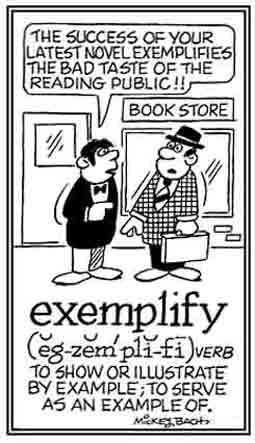em-, emp-, empt-; sump-, -sum-
(Latin: a taking, to take, to take up, to buy, to select; to use, to spend, to consume)
2. An attitude that values the acquisition of material goods.
3. In economy, the belief that the buying and selling of large quantities of consumer good is beneficial to an economy or a sign of economic strength.
Jed consummated a business transaction with the bank for the money he needed to start his automobile dealership.
2. To achieve or to fulfill: Sharon's dream was finally consummated with the publication of her first book.3. Etymology: from Latin consummatus; from consummare, "to sum up, to make up, to complete"; from con-, "intensive" + summa, "highest degree, total".

Go to this Word A Day Revisited Index
so you can see more of Mickey Bach's cartoons.
2. Absolutely terrible or utterly bad: Maggie's brother is considered to be a consummate liar and thief.


Go to this Word A Day Revisited Index
so you can see more of Mickey Bach's cartoons.
2. Etymology: from Latin consummationem, which is from consummare, "to make up, to complete".
2. The dissipation of moisture by evaporation.
3. Wasting of the body by disease; a wasting disease; now applied specifically to pulmonary consumption or phthisis (wasting or gradual deterioration of the body).
4. Wasteful expenditure, waste.
5. The using up of material, the use of anything as food, or for the support of any process.
6. The destructive employment or utilization of the products of industry.
2. Descriptive of something that deserves to be copied and admired: Michael was congratulated by his professor for his exemplary research and outstanding report which was easy for others to easily understand.

In the following image, the man is telling the judge that he will lead an exemplary life, while at the same time, he is stealing his lawyer's billfold; so, he is obviously an example of someone who is not living an exemplary life.

Go to this Word A Day Revisited Index
for a list of additional Mickey Bach illustrations.
Meaning, "for instance" or "for example"; only when giving an example to illustrate a point.
One should always precede this Latin abbreviation with a comma or a semicolon. It is used correctly to introduce an example, but incorrectly to mean "that is" which is id est = i.e.
"I have the laboratory equipment, e.g., [not i.e.] beakers, thermometers, and test tubes; which we need."
Don't end a list that starts with e.g. with etc. In other words, make sure all of the "examples" are listed.
The economic development of the city is exemplified by all of the new buildings that are being constructed.
The writer's plays exemplify both comedy and seriousness.



